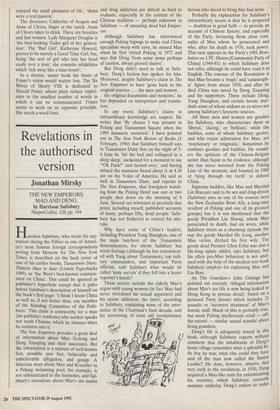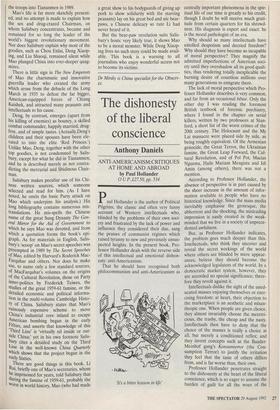Revelations in the authorised version
Jonathan Mirsky
THE NEW EMPERORS: MAO AND DENG, by Harrison Salisbury HarperCollins, f20, pp. 544 Harrison Salisbury, who made his rep- utation during the Fifties as one of Ameri- ca's most famous foreign correspondents writing from Moscow for The New York Times, is described on the back cover of one of his earlier books, Tiananmen Diary: Thirteen Days in June (Unwin Paperbacks 1989), as 'the West's best-known commen- tator on China'. This could be ignored as publisher's hyperbole except that it pales before Salisbury's description of himself on the book's first page: 'I think I know China as well as, if not better than, any member of the Standing Committee of the Polit- buro.' This claim is noteworthy for a man (his publisher confirms) who neither speaks nor reads Chinese, which he misuses when he ventures into it.
The New Emperors provides a great deal of information about Mao Zedong and Deng Xiaoping and their associates. But the information is a mixture of well-known fact, possible new fact, believable and unbelievable allegation, and gossip. A hilarious story about Mao and Kruschev in a Peking swimming pool, for example, is not substantiated in the footnotes, and Sal- isbury's sensations about Mao's sex mania and drug addiction are almost as hard to evaluate, especially in the context of the Chinese tradition — perhaps unknown to Salisbury — of smearing dead bad Emper- ors.
Although Salisbury has interviewed enough Peking bigwigs to make real China specialists weep with envy, he missed Mao when he first visited. Peking in 1972 and says that Deng 'from some sense perhaps of caution, always proved elusive'.
But Deng didn't need to talk to Salis- bury. Deng's faction has spoken for him. Moreover, despite Salisbury's claim in The New Emperors to have 'gone back to the original sources . . . the men and women . . . the original documents and memoirs,' he has depended on interpreters and transla- tors.
In any event, Salisbury's claims to extraordinary knowledge are suspect. He writes that `By chance I was present in Peking and Tiananmen Square when the 1989 massacre occurred.' I have pointed out in The New York Review of Books (1 February, 1990) that Salisbury himself says in Tiananmen Diary that on the night of 3- 4 June he 'hit the bed and collapsed in a deep sleep,' awakened for a moment to say "`Oh Fuck!" and turned over,' and having missed the massacre heard about it at 4.30 am on the Voice of America. He said as well in Tiananmen Diary, and repeats in The New Emperors, that foreigners watch- ing from the Peking Hotel saw one or two people shot down on the morning of 4 June. Several eye witnesses at precisely that point, including myself, published accounts of many, perhaps fifty, dead people. Salis- bury has not bothered to correct his mis- take.
Why have some of China's leaders, including President Yang Shangkun, one of the main butchers of the Tiananmen demonstrators, for whom Salisbury has warm feelings (although he has remonstrat- ed with Yang about Tiananmen), top mili- tary commanders, and important Party officials, told Salisbury what would be called 'state secrets' if they fell into a lesser reporter's hands?
These secrets include the elderly Mao's orgies with young women (in fact Mao had never restrained his sexual appetites) and his opiate addiction, the latter, according to Salisbury, explaining some of the enor- mities of the Chairman's final decade, and his terrorising of even old revolutionary heroes who dared to bring him bad news.
Probably the explanation for Salisbury's extraordinary access is that he is prepared — doubtless in good faith — to provide an account of Chinese history, and especially of the Party, favouring those close com- rades of Mao whom he persecuted and who, after his death in 1976, took power. This view appears in the Party's 1981 Reso- lution on CPC History. [Communist Party of China] (1949-81) to which Salisbury does not refer, although he could have read it in English. The essence of the Resolution is that Mao became a 'tragic' and 'catastroph- ic' figure from about 1958, and after he died China was saved by Deng Xiaoping and his supporters. These include Deng, Yang Shangkun, and certain heroic mar- shals some of whose widows or ex-wives are among Salisbury's favourite sources.
All these men and women are goodies for Salisbury, who characterises them as `liberal,' daring,' or 'brilliant,' while the baddies, some of whom Salisbury quotes, and who retain admiration for Mao, are `reactionary' or 'enigmatic.' Sometimes he confuses goodies and baddies. He consid- ers the opinions of the Chinese-Belgian writer Han Suyin to be evidence, although she has never wavered from the Peking Line of the moment, and boasted in 1980 of 'lying through my teeth' to defend China.
Supreme baddies, like Mao and Marshal Lin Biao,are said to be sex and drug-driven (Salisbury uses as one of his sources here the New Zealander Rewi Ally, a long-time resident of Peking and one of its greatest gossips) but it is not mentioned that the goody President Liu Shaoqi, whom Mao persecuted to death, had six wives, while Salisbury treats as a charming episode the way the goody Marshal He Long, another Mao victim, ditched his first wife. The goody dead Premier Chou Enlai was also a life-long opiate addict, says Salisbury, but his often pro-Mao behaviour is not anal- ysed with the help of the medical text-book Salisbury employs for explaining Mao and Lin Biao.
As The Guardian's John Gittings has pointed out recently 'Alleged information about Mao's sex life is now being leaked to Hong Kong in precise detail,' based on a personal Party dossier which includes 21 assaults or 'incorrect treatment' of Mao's female staff. Much of this is probably true, but many Peking intellectuals retail — off- the-record — similar sexual scandal about living grandees. Deng's life is adequately traced in this book, although Salisbury reports without comment that the inhabitants of Deng's home village remember what a splendid lit- tle boy he was; what else could they have said of the man now called the Senior Leader? He does, however, observe that very early in the revolution, in 1930, Deng acquired a Mao-like taste for exterminating his enemies, which Salisbury correctly assumes underlay Deng's orders to order the troops into Tiananmen in 1989.
Mao's life is far more sketchily present- ed, and no attempt is made to explain how the sex and drug-crazed Chairman, on whom Salisbury concentrates, became and remained for so long the leader of the world's biggest revolutionary movement. Nor does Salisbury explain why most of the goodies, such as Chou Enlai, Deng Xiaop- ing, and Liu Shaoqi, remained silent while Mao plunged China into ever-deeper quag- mires.
There is little sign in The New Emperors of Mao the charismatic and innovative guerrilla leader who created the army which arose from the debacle of the Long March in 1935 to defeat the far bigger, American-equipped forces of Chiang Kaishek, and attracted many peasants and Intellectuals to his cause.
Deng, by contrast, emerges (apart from his killing of enemies) as bouncy, a skilled combat commander, happily married, drug- free, and of simple tastes. (Actually,Deng's children and their spouses have been ele- vated to into the elite 'Red Princes.') Unlike Mao, Deng, together with the other top goodies, is not condemned by Salis- bury, except for what he did in Tiananmen, and he is described merely as not contra- dicting the mercurial and libidinous Chair- man.
Salisbury makes peculiar use of his Chi- nese written sources, which someone selected and read for him. (As I have noted, he omits the basic Party attack on Mao which underpins his analysis.) His long bibliography contains numerous nus- translations. He mis-spells the Chinese name of the great Sung Dynasty The Gen- eral Mirror for the Aid of Government to which he says Mao was devoted, and from which a quotation forms the book's epi- graph. As for materials in English, Salis- bury's 'scoop' on Mao's secret speeches was preempted in 1989 by The Secret Speeches of Mao, edited by Harvard's Roderick Mac- Farquhar and others. Nor does he make use, to name only a few standard sources, of MacFarquhar's volumes on the origins of the Cultural Revolution, those on Party inner-politics by Frederick Teiwes, the studies of the great 1959-61 famine, or the detailed economic and political informa- tion in the multi-volume Cambridge Histo- rY of China. Salisbury states that Mao's ruinously expensive scheme to move China's industrial core inland to escape American bombing began in the early Fifties, and asserts that knowledge of this Third Line' is 'virtually nil inside or out- side China;' yet in his own footnote Salis- btSalis- burycites a detailed study on the Third Line in the well-known China Quarterly which shows that the project began in the early Sixties.
There are good things in this book. Li Rut, briefly one of Mao's secretaries, whom he imprisoned for years, told Salisbury that during the famine of 1959-61, probably the worst in world history, Mao (who had made a great show to his bodyguards of giving up pork to show solidarity with the starving peasants) lay on his great bed and ate bear- paws, a Chinese delicacy so rare Li had never heard of it.
But the bear-paw revelation suits Salis- bury's hosts: very likely true, it shows Mao to be a moral monster. While Deng Xiaop- ing lives no such story could be made avail- able. This book is a warning to all journalists who enjoy wonderful access not to become its victims.
Dr Mirsky is China specialist for the Observ- er.



















































 Previous page
Previous page